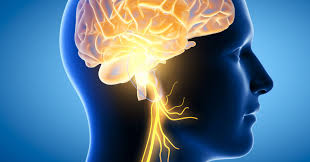Exploring Vagus Nerve Damage and What it Means
Vagus nerve damage is a serious medical condition that can have far-reaching consequences for those affected by it. The vagus nerve, which runs from the brain stem through the neck and chest to the abdomen, plays an important role in regulating bodily functions such as digestion and heart rate.
Damage to this vital nerve can lead to a wide range of physical problems, including difficulty with eating or speaking, a loss of sensation in certain parts of the body, or even paralysis. It is important to know these vagus nerve damage symptoms when deciding on treatments.
In addition to these physical effects, vagus nerve damage may also cause emotional distress due to its impact on communication abilities and self-esteem.
This article will look at what causes vagus nerve damage and how it affects people’s lives, before considering potential solutions for managing its symptoms.
Contents
What Causes Vagus Nerve Damage?
Vagus nerve damage can be caused by a variety of conditions, including stroke, traumatic brain injury (TBI), tumour growths, autoimmune diseases such as lupus or rheumatoid arthritis, and infections. Treatment typically depends on the underlying cause of vagus nerve damage; for example, treating the infection that caused it or removing a tumour that is pressing on the nerve.
It can become important to understand the different nerves in the body, in particular the less-known vagus nerve. It helps doctors with their diagnoses.
What are the Symptoms of Vagus Nerve Damage?
The symptoms of vagus nerve damage can vary widely depending on the severity and location of the damage. In general, however, some common signs include difficulty swallowing or speaking, loss of sensation in certain parts of the body (such as the face), and paralysis of muscles in the face or throat. Other symptoms may include dizziness, fainting, nausea, diarrhea, and unexplained weight loss.
How Can Vagus Nerve Damage be Managed?
Vagus nerve damage can be managed through a variety of treatments, depending on the underlying cause. Some common treatments include medications to reduce inflammation, physical therapy to regain muscle strength and coordination, and surgery to repair the vagus nerve itself. In some cases, vagus nerve stimulation (VNS) can be used to send electrical signals through the vagus nerve to help regulate body processes.
It is important to first identify that there is damage before looking at the alternatives to help. This might be within medical environments or patients’ own homes. This avoids the need to travel and makes treatment plans seem less of a hardship. They can be fitted around busy lifestyles.
Home Devices and Other Therapies
There are also home devices and therapies that can be used to help manage vagus nerve damage. These include techniques such as deep breathing, progressive muscle relaxation, and biofeedback exercises to help reduce stress levels.
In addition, there are various devices available, such as vagal nerve stimulators (VNS), that can be used to send electrical signals through the vagus nerve to help regulate body processes.
It pays to know the different devices on the market so that everyone can benefit from their convenience and the potential to tackle some debilitation conditions. This will mean that patients enjoy life more and doctors have extra time to focus on other medical matters. Patient lists seem to grow rather than the other way around, making home treatments an important option to consider.
Conclusion
Vagus nerve damage can have a significant impact on the quality of life for those affected by it. If you or someone you know is experiencing vagus nerve damage, it’s important to speak with a medical practitioner about available treatment options. This may include medications, physical therapy, vagus nerve stimulation (VNS), and other home therapies. With the right support and management, vagus nerve damage can be effectively managed so that those affected can lead healthy and fulfilling lives. If necessary, you can also seek assistance from traumatic brain injury lawyers if ever needed.




